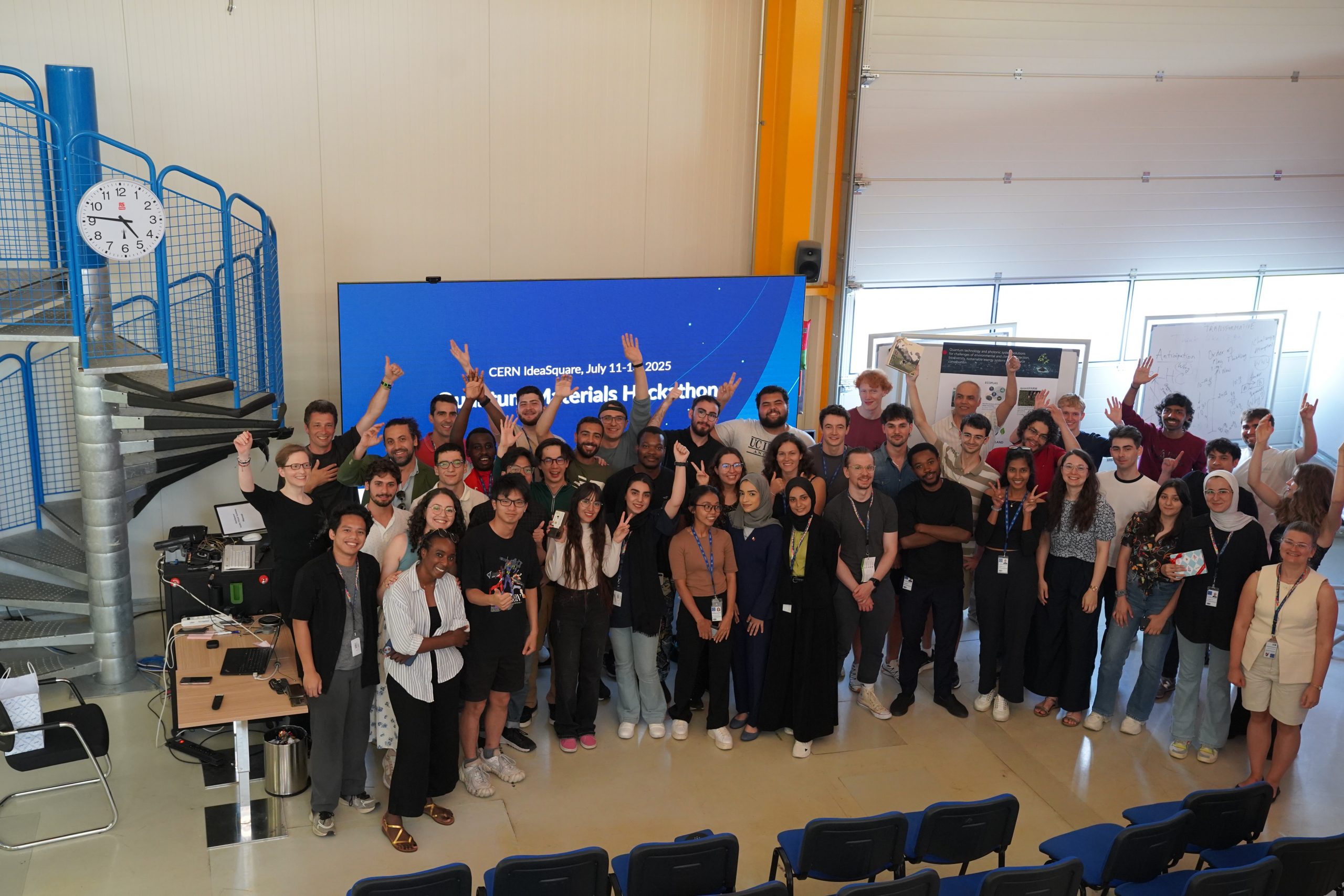Hacking quantum materials for sustainable development
21st July 2025
Article by Alexia Yiannouli

From 11-13 July, 35 students from over 20 countries came together at CERN IdeaSquare to take part in a hackathon co-organised by OQI and the University of Geneva (Geneva Responsible Entrepreneurship Center).
Participants came from a diverse range of academic backgrounds and institutions, including CERN’s Summer Student Programme, the University of Geneva (UNIGE), ETH Zurich, University of Applied Sciences and Arts Northwestern Switzerland (FHNW) and École Polytechnique Fédérale de Lausanne (EPFL) – to explore how quantum computing could be used to design new quantum materials and contribute to the progress of the UN Sustainable Development Goals (SDGs).
What do we mean by a quantum material?
Quantum materials display unique and sometimes unusual properties due to the laws of quantum mechanics. One example of such material is graphene, which can be used in things like batteries, sensors and touchscreens.
Because these materials behave according to the principles of quantum mechanics, many consider their design and modelling to be an area where quantum computing has the possibility of outperforming classical computers.
Hackathon challenges
Six teams explored a range of pre-set challenges to discover how quantum computing could be utilised to design novel quantum materials and contribute to the SDGs. Participants were tasked with outlining how they would approach implementing a quantum algorithm to design such a material, and to begin refining these quantum algorithms with the support of mentors from CERN and AWS. Amazon Braket proved to be particularly useful in this regard as it allowed participants to simulate quantum computing resources and explore potential solutions across multiple quantum hardware architectures.
The challenges included:
Water Splitting for Hydrogen Production (challenge submitted by ETH Zurich Quantum Center)
This challenge focused on developing more efficient and affordable ways to produce hydrogen fuel through water splitting, a process that uses energy to break down water molecules into hydrogen and oxygen. Current methods rely on expensive platinum-based catalysts, but using graphene with cheaper materials has the potential to improve efficiency and reduce costs. Addressing SDG 7 (affordable and clean energy) and SDG 13 (climate action), this challenge aimed to explore how quantum computing could help design new materials to make hydrogen production more sustainable.
Quantum Spin Liquids (challenge submitted by UNIGE, Faculty of Science)
This challenge explored Quantum Spin Liquids (QSL), a state of matter that has not yet been proven to exist, but one that, if viable, could contribute to the development of new materials with unique properties. Because they are difficult to simulate with classical computers, students worked on defining a Qbit architecture that could simulate QSLs and discover their potential uses.
Quantum Relational Spectroscopy Toolkit (challenge submitted by FHNW, Applied Quantum Technologies Lab)
This challenge aimed to develop a toolkit to study molecular rotational spectroscopy (how molecules rotate), to explore areas such as improving chemical reactions and identifying small biological molecules, considering the impact towards the SDGs.
Battery Materials Discovery (challenge submitted by EPFL, QSE Centre)
Batteries are often made of materials with properties that require quantum simulation, which can be difficult using classical computational techniques. This challenge investigated how quantum computing could be used to design and discover quantum materials that could make safer and more sustainable batteries.
High-Performance Quantum Dots for Solar Harvesting (challenge submitted by CERN Quantum Technology Initiative – QTI)
A quantum dot is a nanoparticle known for its unique quantum material properties, and can sometimes be used to absorb a wide range of light frequencies – making them ideal for applications such as solar panels. However, many of their commercial applications rely on chemicals toxic to the environment. This challenge explored how quantum computing could design quantum dots that are less damaging to the environment and more efficient in producing clean and renewable energy.
Next-Generation Highly-Conductive and Superconductive Materials (challenge submitted by CERN Quantum Technology Initiative – QTI)
This challenge focused on how quantum computing could be used to discover better conductive and superconductive materials, with the potential of making more sustainable and efficient energy transmission.
Building a quantum computing community
Going beyond technical problem solving, the hackathon also aimed to:
- Help participating students build practical skills in the field of quantum computing and quantum materials.
- Connect academia with industry, bringing together researchers, industry leaders and young talent to foster collaborations.
- Continue to grow the OQI community and promote ongoing collaboration beyond the hackathon.
We would like to extend our thanks to all supporters of the hackathon: Université de Genève, UNIGE Faculty of Science, Geneva Responsible Entrepreneurship Center, Geneva School of Economics and Management – UNIGE, IdeaSquare – the innovation space at CERN, Quantum Center, ETH Zurich, CERN openlab, CERN Quantum Technology Initiative (QTI), University of Applied Sciences and Arts Northwestern Switzerland FHNW, EPFL Centre for Quantum Science and Engineering (QSE), Quantum4Purpose, QAI Ventures, Alice & Bob, Fraunhofer Institute for Industrial Engineering IAO, 4EU+ European University Alliance.
And a big thank you to our sponsors: SGInnovate Summation Programme For Talent, Amazon Web Services (AWS).
Find out more about upcoming hackathons.
